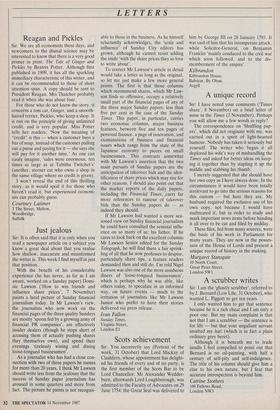Just jealous
Sir: It is often said that it is only when you read a newspaper article on a subject you know a great deal about that you realise how shallow, inaccurate and misinformed the writer is. This week I find myself in just that position.
With the benefit of his considerable experience (he has never, as far as I am aware, worked on a Sunday paper) Domi- nic Lawson Mow to win friends and influence share prices', 7 November) paints a lurid picture of Sunday financial journalism today. In Mr Lawson's view, the journalists who now work on the financial pages of the three quality Sundays are mostly 'spoon fed by a growing army of financial PR companies', are effectively insider dealers (though he stops short of accusing them of actually pushing shares they themselves own), and spend their evenings 'tirelessly wining and dining loose-tongued businessmen'.
As a journalist who has had a close con- nection with two of three papers he names for more than 20 years, I think Mr Lawson should write less from the jealousy that the success of Sunday paper journalism has aroused in some quarters and more from fact. The picture he paints is not recognis- able to those in the business. As he himself reluctantly acknowledges, the 'scale and influence' of Sunday City editors has grown, although he cannot resist adding the snide 'with the share prices they so love to write about'.
To correct Mr Lawson's article in detail would take a letter as long as the original, so let me just make a few more general points. The first is that those columns which recommend shares, which Mr Law- son finds so offensive, occupy a relatively small part of the financial pages of any of the three major Sunday papers: less than five per cent in the case of the Sunday Times. This paper, in particular, carries two economic columns, major business features, between five and ten pages of personal finance, a page of innovation, and examinations of business and financial issues which range from the state of the Japanese economy to pieces on small businessmen. This contrasts somewhat with Mr Lawson's assertion that the two main pursuits of Sunday papers are the anticipation of takeover bids and the iden- tification of share prices which may rise for other reasons. I should also point out that the market reports of the daily papers, including the Financial Times, carry far more references to rumour of takeover bids than the Sunday papers do — as indeed they should.
If Mr Lawson had wanted a more sea- soned view on Sunday financial journalism he could have consulted the seminal influ- ence on so many of us: his father. If he cares to look back on the excellent columns Mr Lawson Senior edited for the Sunday Telegraph, he will find there a fair sprink- ling of all that he now professes to despise, particularly share tips, a feature readers demanded then and still do. I'm told Nigel Lawson was also one of the more assiduous diners of loose-tongued businessmen', which is perhaps why he was able, like others today, to speculate in an informed way, on future events — much to the irritation of journalists like Mr Lawson Junior who prefer to have their stories delivered via press release.
Ivan Fallon Sunday Times, Virginia Street, London El










































































 Previous page
Previous page